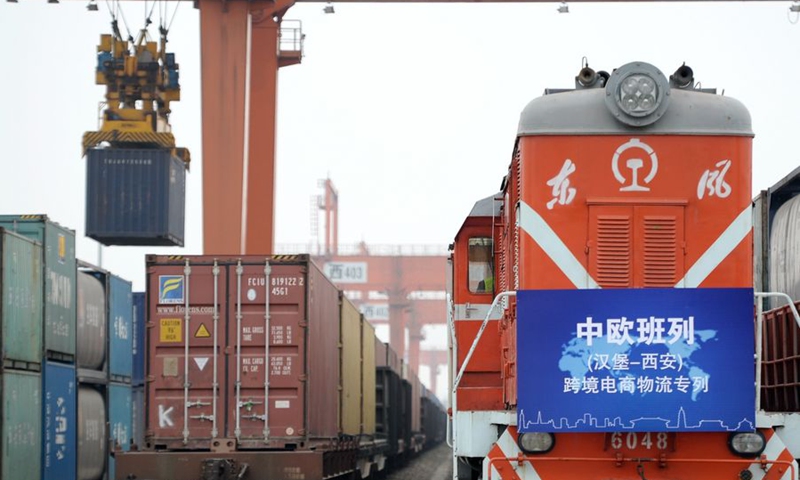
A cross-border e-commerce freight train from Hamburg of Germany arriving in Xi'an, northwest China's Shaanxi Province. (Xinhua/Li Yibo)
The Russia-Ukraine conflict has profoundly changed the geopolitical landscape and trend of the world, with significant implications for China, both positive and negative. Now some officials and scholars in the US and the West are hyping the damage caused by the conflict to the China-proposed Belt and Road Initiative (BRI), especially to the railway freight route connecting China and Europe via Kazakhstan, Russia and Belarus, and using it as a pretext to ask China to put pressure on Russia, which is mainly a Western narrative to sow discord in relations between China and Russia.
Of course, the BRI has been negatively impacted by the Russia-Ukraine conflict. Firstly, the Eurasian Land Bridge has been directly affected. The China-Europe Railway Express' primary route westward has been through Russia, Belarus, Poland, or the Baltic coast. The route through Ukraine has been cut off by the war. It also no longer stops in Lithuania. Secondly, China's investments in Ukraine have been impacted by the war. This largely included wind power and photovoltaic fields. Thirdly, to some extent, China-EU trade has been affected by the conflict, although not greatly. The cargo trade between China and Europe is mainly by sea, with railway transportation accounting for only 5 percent. However, due to EU sanctions against Russia, many European operators have also decided to withdraw from transportation through Russia and Belarus.
From the perspective of China's interests and the interests of Ukraine, Russia and other European countries, we hope that the war can be ended as soon as possible, the problem be solved through negotiation, peace be restored as soon as possible, and normal economic operation be resumed.
The deteriorating relations between Russia and the West have led economic relations between China and Russia to become closer, with all of Russia's political, business and economic circles turning their eyes to China. Reliance on Chinese goods has also increased to replace Western ones.
In addition, it has energized China's BRI and Russia's Greater Eurasian partnership, which include greater cooperation with states in Central Asia and Mongolia. As European countries seek trade routes which do not need to go through Russia, this has also diversified trade and commercial routes of the BRI to include new China-Europe railway links through the trans-Caspian and Black Sea routes.
In the long term BRI cooperation between China and Europe may be strengthened. The negative impact of the Russia-Ukraine conflict on the European economy is significant and will create further pre-requisites for China-Europe cooperation. The world's largest market is in Asia, and the connection with China and East Asian markets is the fundamental way out for the development of the EU. Promoting the shift of global industrial chains and supply chains out of ideological purposes cannot change this objective fact.
In the future, the BRI is also likely to focus more on China's periphery, especially Southeast Asia. The opening of the China-Laos railway, progress on the China-Laos-Thai-Railway will open new opportunities. This will coincide with the China-Vietnam railway to make a network. China's trade with Southeast Asia is about $800 billion a year. China and ASEAN have RCEP, China-ASEAN Free Trade Agreement and other soft mechanisms. ASEAN focuses on economic development, not to choose sides between China and the US.
The Russia-Ukraine conflict will also lead China to choose countries with a more stable situation to build BRI projects, including in green development, health and digital economy, aware of the US' intention to cause trouble and to create proxy wars. The Federal Reserve's interest rate hikes have left many developing countries in economic crisis, which the US has sought to blame on China. However, the destruction of the economic and political stability of these countries by the US will have a backfire effect in the long run.
China will learn the lessons from the impact of the Russia-Ukraine conflict and Western sanctions on Russia. China-US competition over the BRI is a battle over rules and standards. The sanctions the West unilaterally slapped on Russia will undercut Western credibility and the universality of US-led standards across the board, showing the consequences of relying on the US-led system, giving China and others the opportunity to promote alternatives.
The author is secretary-general of the Research Center for China-South Asia Cooperation at the Shanghai Institutes for International Studies, and distinguished fellow of the China (Kunming) South Asia & Southeast Asia Institute. opinion@globaltimes.com.cn


